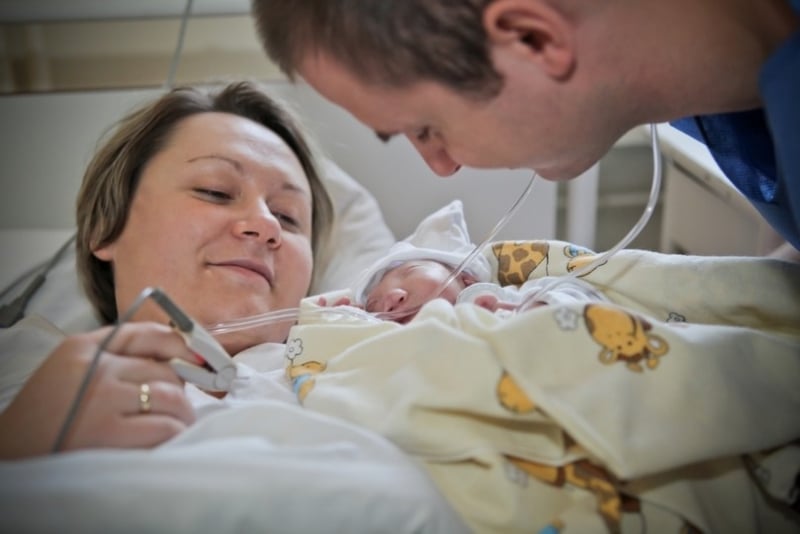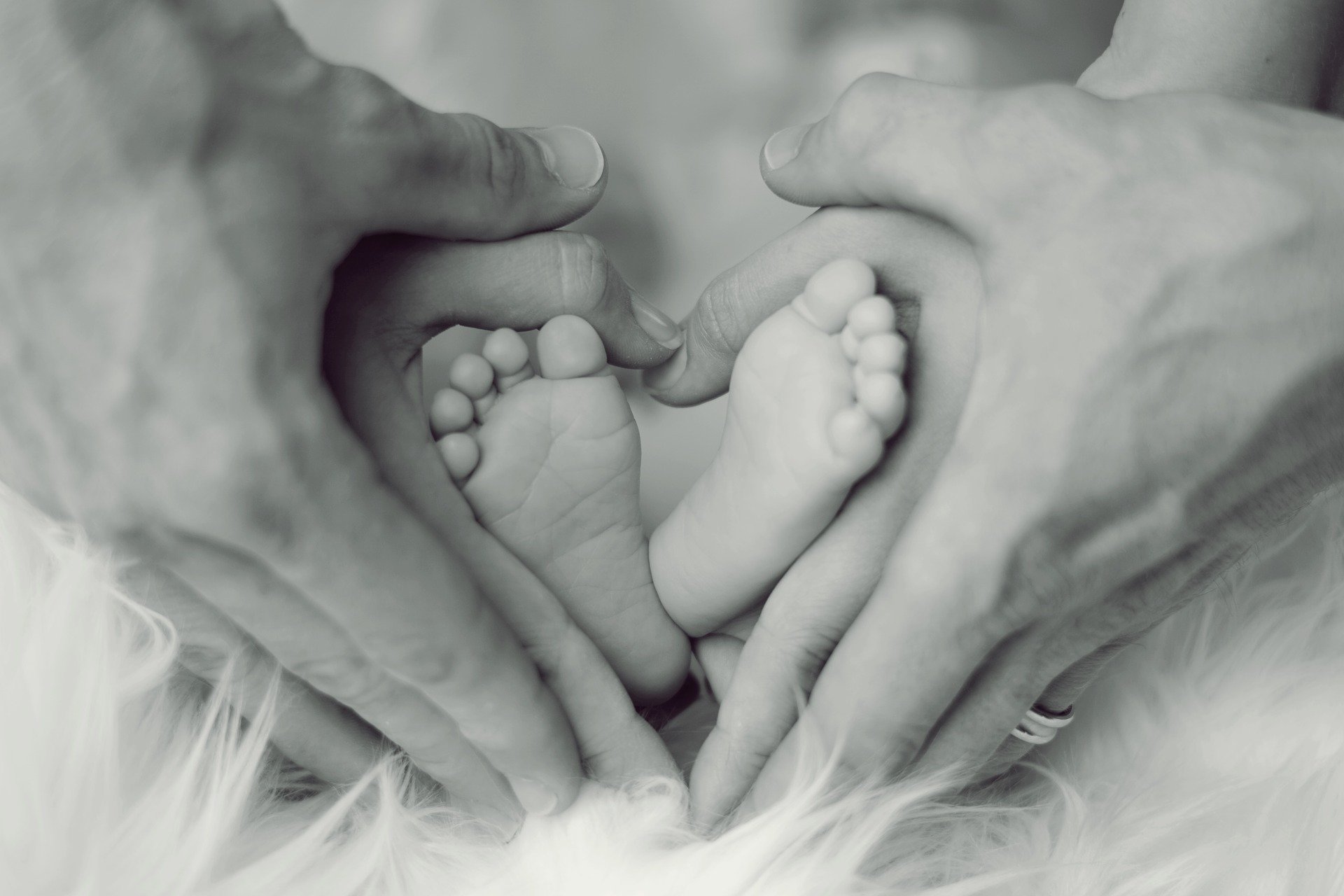Perinatal hospices as an alternative to abortion – Where love is greater than fear (interview)

A conversation about perinatal and neonatal palliative care as an alternative to abortion in Poland, where the Constitutional Tribunal has banned abortions motivated by serious and incurable disability or disease of the unborn child.
Tisa Zavrocka-Kwiatkowska, founder and chairwoman of the Gajusz Foundation, was interviewed in Polish by Agnieszka Golanska-Bault for the Do Rzeczy weekly last summer.
***
In 1998, you established the Gajusz Foundation for children’s palliative care in Lodz. An important aspect of your work is that you run a perinatal hospice. It seems to me that the term “perinatal hospice” is not widely known. What is it exactly?
A perinatal hospice is not so much a place as a way of caring for an entire family where, at some stage in the pregnancy, there has been a diagnosis or a very serious suspicion that the child to be born is terminally ill.
It is primarily about emotional and psychological support and organizational assistance. When a child’s mom and dad turn up, I say that I have three patients entering my office. Usually a doctor is involved already in the first meeting, because people who get a bad diagnosis are most often under such stress that they simply don’t remember anything of what they are told. That’s why our doctor checks what the parents already know and whether it conforms to reality. She has a great deal of time for them, as such a visit often lasts two hours.
Then our doctor transfers the family to the care of a psychologist, and at some stage in this process I also get involved. I am in charge of arranging the birth. I am sorry to say that I’ve had a lot less of this work lately, because hospitals have not yet returned to normal operation after COVID. Before the pandemic, it was perfectly natural for everyone to have outsiders – such as myself, a priest, and a photographer – at the birth of a child. Sometimes, we would even be in the operating room during a Cesarean section. Now, however, there is huge resistance to returning to such a way of working. This is a great pity.

Do you mean that difficulties in your work today are a consequence of the recent public health crisis?
Exactly, yes, and I have the impression that it has been used, unfortunately, so that hospitals don’t have to keep working that way. There is no doubt that this requires a lot of effort and cooperation on the part of hospitals. We are trying to overcome this resistance, although here in Lodz our cooperation with the local hospital is better than anywhere else. We have a psychologist and midwives there who work with us. This helps compensate for the effects of our no longer being present at the patient’s side during delivery. We also miss the pre-pandemic practice of systematically organizing meetings with the participation of all stakeholders: parents, hospice workers, gynecologists, obstetricians, and the coordinating nurse. I am absolutely convinced that such meetings should be mandatory in every case, and that this should be imposed by law. During this type of joint consultation, everything can be established to avoid any miscommunication and guarantee the family the necessary peace of mind. In addition, the committee taking part in this consultation creates a document that is binding on every hospital – not just the one where we have planned for the patient to give birth. The medical staff, with such a document in hand, always knows what has been agreed and what to do. This is unfortunately not happening now.
How many families benefit from your perinatal hospice on an annual basis, and do you see an increase in interest in this form of care?
Until recently, it was about 20 families a year. But in 2022, we saw a drop to 11 families, despite the legal changes.
The Constitutional Tribunal ruling of October 22, 2020, which you are referring to, declared unconstitutional the eugenic motive for aborting pregnancies. From what you are saying, this ruling did not increase interest in this form of care for sick children and their families, nor did it have an impact on the attitude of health care professionals toward your activities.
We have developed a form of cooperation with hospitals, but this does not function automatically. Patients come to us without having a referral for perinatal care. Often I have to send them back, if only to a primary care physician who can make such a referral. I don’t understand this. If a doctor has a woman in front of him in an extreme crisis situation, the sooner she learns that there is such a place where she can get help, the better for her. Since a referral is required, the doctor should always give her one. Meanwhile, women regularly find out about us on their own and contact us using the information found on our website or Facebook page. A woman leaving the doctor in a state of deep crisis, as one can probably imagine, seeks help on her own.
Donald Tusk’s government will not find it easy to liberalize abortion in Poland
A few years ago, during a conversation we had at the Gajusz foundation’s headquarters in Lodz, you said that posters with information about the activities of perinatal hospices were being torn down in hospitals by medical staff. Has this changed?
Since this was happening systematically, we stopped hanging posters. We try our best to cooperate with the medical staff, but this is really a huge job.
What is the reason for doctors’ reluctant attitude to the idea of hospice perinatal care?
I find it difficult to answer this question. I can only quote what our patients have told us. Doctors do not understand at all why such places exist, why condemn a woman to the horrific trauma of childbirth in such a situation. Before the change in the law [as a result of the above-mentioned 2020 ruling of the Polish Constitutional Tribunal], they used to tell their patients that such a pregnancy should be terminated as soon as possible, so that they forget about it and preferably get pregnant again quickly. This simply shows their ignorance. But there is also another issue. Much has been said about the fact that women should have a choice. I talk to women with the most diverse views, and they all emphasize that this choice actually does not exist or is very limited. And paradoxically, this is especially true for women who want to give birth to a sick child.
In the accompanying explanation of its 2020 ruling, the Constitutional Tribunal stated that the legislature was obliged to adapt Poland’s laws and policies so that the parents of an irreversibly disabled or terminally ill child would be guaranteed the necessary assistance from the public authorities. How do you assess the Morawiecki government’s actions in this regard over the past two years concerning perinatal hospice care?
In my opinion, nothing has changed for the better. As for state funding, though, we can’t complain. This service has received a valuation [by Poland’s public health insurance institution], and there are so few patients that we can handle things financially. Women whose children survive childbirth have the option of leaving their child in an inpatient palliative care service or taking the child home, where all palliative care will be provided. This has worked not too badly for years, but it has nothing to do with the legal changes.
After the Constitutional Tribunal’s ruling, there should have been some kind of education for those who take part in communicating the medical diagnosis. There should have been a monitored obligation to make referrals to a perinatal hospice, as well as the obligation that I have mentioned, to organize a joint consultation with the participation of all concerned. And there should also be some accountability for this. Since this is not happening, it means that the system is not working as it should.
I would like to tell you about one more thing, which for me personally is shocking, and which you can read about on Internet forums. There are regular accounts of patients with bad diagnoses being sent by doctors to London to “get rid of the problem” there. Situations can vary, but most often the procedure followed is that a doctor, guided by ultrasound, administers a lethal injection into the baby’s heart. The heart stops beating, and the woman returns to Poland. There, the fetus is found to have died and labor is induced. In order to assess the impact of the legal change on the actual number of terminations of pregnancies involving children with lethal defects, it would suffice to do a statistical study and see how many such children are currently born in Poland. It is known that two to three children per thousand have lethal defects. That’s simple math. And yet no one has ever done such a study.
How Poland’s Law and Justice failed its pro-life voters on abortion (interview)
As I understand it, there is no problem with the availability of hospice perinatal care in Poland. Rather, there is a lack of patients, as most fail to ask for this kind of care.
On the one hand, yes, and on the other hand, I also think that this is really a very complicated process. Imagine, for example, what a huge challenge it is for perinatal hospice staff to work with patients who do not want to give birth.
We are managing because we have very good, experienced specialists, but I imagine that many perinatal hospices are very much “Church” institutions. Such hospices should also exist, of course, because for women of deep faith, their world views and religiosity are very helpful in their choice. This is what they want. But a non-believing woman can feel judged as a bad mom in such places, and that’s no way to work with a patient. I, of course, personally have my own views and each of the perinatal hospice staff has some private views on the subject, but we do not disclose them at all here. We are transparent, so that any woman, regardless of what she thinks, what she is afraid of, what she wants to ask us, can come to us without fear. They regularly ask when they have doubts: “Do you think that I’m a bad mother?” Well, I don’t think she is being a bad mother, I don’t judge anyone. I am supposed to act as a professional, as an organizer who says what kind of help we offer. Nothing more.
Sometimes I tell our patients what other women say, because that’s what they are most interested in. For them, only another mom can really be relied on. Parents who are over it confirm that a person is completely unaware of what he or she will go through and the emotions that will accompany it, and these are usually quite the same. A child awakens love, really. No matter what child and no matter what he or she is lacking. When we had atheists at our hospice, they pointed out to me, in a very conscious way: “For us, this is the only chance to get to know our child. For us, there is no after, so we have to prepare for this as best we can. There will be no second chance.”
Does it happen that a family comes to your hospice but later decides not to accept your palliative care?
No, this has never happened. We do our utmost to ensure that this does not happen. The idea is that parents who cross the foundation’s threshold should feel that we care a lot about them, that we are waiting for them, that we are friendly to them. This is a qualitative difference. They enter like the most anticipated guests. I think they are very positively surprised after what they have experienced before.
What do you personally find most difficult about this job?
The difficult thing for me is that the system of perinatal hospice care doesn’t work well, and it wouldn’t take much to make it work well. A few simple decisions would be enough. This pretending makes me angry. We all know what is needed, but no one does anything.
We do all we can. Information about our activities reaches people through Facebook, for example. I feel that by writing posts, I serve an educational function, as by that means I show what such births look like. For mothers who learn of a lethal diagnosis, this is the most important information. They want to know what is going to happen, what they are likely to feel. I describe real situations and I quote real words, even if these posts are sometimes a compilation of different stories. Moms who have been affected often write to me to tell me that I have captured everything “on point.” The Gajusz Foundation is trying to change reality, and that’s why we’re talking about it today.
On the pages of your foundation there is a link to the “No facemasks in hospice” petition. Are you still required to wear facemasks when working with children in a hospice?
Fortunately, this obligation was finally lifted on July 1. For me, it was a completely absurd situation. A very sick child is born, but has normal intellectual development, for example. How can a short-lived child be condemned never to see a human face? Our children usually come to this world for a short while, and in palliative care we focus not on prolonging life, but on the quality of life. It seems to me that a smile will always affect a person’s quality of life. Why did someone want to take this away from the sickest children? Nearly a year ago, we sent a letter to the Minister of Health on this issue, but received a negative response that referred only to the current regulations. There was no flexibility and no possibility was given for individual interpretation in children’s hospices. Hence this petition. In this way, we reached out with information to people who did not even know that such a situation was taking place.
Where do you get the strength to take on difficult challenges?
We ourselves have very good experiences in our work. I feel that the Gajusz Foundation is a kind of enclave where we experience great goodness. Personally, I love my job. It gives me the feeling that I am doing something, and a sense of meaning. I love our women patients and the children in our care. It seems to me that I have the greatest job in the world. I don’t know how it’s possible, but although I’ve been in charge of the Gajusz Foundation for 25 years, there’s not the slightest trace of professional burnout in me. I find people very inspiring and there is so much you can do for them. One of our mothers who gave birth to a terminally ill child spoke a phrase that I often repeat: “We don’t know at all what will happen, what we will feel. But tell other mothers that I guarantee them the love will be much greater than the fear.”
To the rescue of mothers and children. The Church provides a real alternative to abortion
This interview was first published in Polish in the Do Rzeczy weekly in August 2023.



